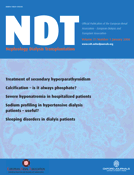-
PDF
- Split View
-
Views
-
Cite
Cite
Georgios Efstratiadis, Evangelia Boura, Panagiotis Giamalis, Evdokia Mandala, Maria Leontsini, Georgios Tsiaousis, Dimitrios Memmos, Renal involvement in a patient with visceral leishmaniasis, Nephrology Dialysis Transplantation, Volume 21, Issue 1, January 2006, Pages 235–236, https://doi.org/10.1093/ndt/gfi157
Close - Share Icon Share
Sir,
Human visceral leishmaniasis, a parasitic infection caused by the protozoan Leishmania and responsible for approximately 5000 deaths annually, is more frequently reported in immunocompromised individuals, such as HIV patients [1] and renal transplant recipients [2], and can rarely involve the kidneys, in the form of haematuria, proteinuria or renal function impairment. Herein, we report the case of a patient of good immunological status suffering from visceral leishmaniasis with severe, histologically confirmed renal involvement, where successful treatment of the disease resulted in improvement of renal function.
A 65-year-old Caucasian man, with an 8-year-long history of type 2 diabetes mellitus (under insulin treatment), was referred to our department because of pancytopenia (WBC 2.300/mm3, haematocrit 25.5%, and platelets 80 000/mm3) and renal failure (urea 184 mg/dl, serum creatinine 5 mg/dl, 2 g protein/24 h urine collection). Clinically, hepatosplenomegaly was noted. Extensive viral serology was only positive for hepatitis B surface antigen, and immunological investigation was unremarkable. Ultrasonography revealed that the kidneys were normal in appearance and length (10.5 cm). Bone marrow aspiration and biopsy indicated the presence of phagocytes and monocyte fragments filled with leishmanias, as well as PAS-stain positive granules in the protoplasm of histiocytes. Serum antibodies against Leishmania infantum were found positive, confirming the diagnosis of chronic visceral leishmaniasis. The subsequent renal biopsy revealed chronic tubulointerstitial nephritis, arteriosclerosis, mild diabetic glomerulosclerosis and absence of the parasite. Immunohistochemical stains showed sparse IgM and C3d mesangial and IgG basement membrane depositions. The patient received treatment with liposomal amphotericin B (AmBisome®) and corticoids, gradually resulting in a significant improvement of renal function (creatinine: 2.5 mg/dl, urea: 110 mg/dl, proteinuria: 300 mg/24 h) within the first 10 days of therapy, and a later decrease in titre of the antibodies against Leishmania.
There have been reports of visceral leishmaniasis with involvement of almost all systems, however renal involvement is scarce and appears as glomerulonephritis or interstitial nephritis (or both) [3,4]. There are also significant indications, mainly derived from observations in animals [5,6], that involvement of both glomeruli and tubules results from immune complex deposition, the antigens of which belong to the parasites [6]. In addition to that, we attributed our patient's interstitial nephritis to the systemic parasitic disease, because renal function improved while treating the infection and no other possible causes (e.g. drugs) could be found in the patient's history. However, based on present serum immunology and immunohistochemical findings, we cannot be certain of the immune-mediated nature of the renal involvement, although it seems likely.
In conclusion, visceral leishmaniasis must be in the mind of the clinician treating a patient with constitutional symptoms, pancytopenia and renal involvement. Confirmation of a likely immune pathogenetic mechanism would facilitate treatment, but is still pending.
Conflict of interest statement. None declared.
References
Rollino C, Bellis D, Beltrame G et al. Acute renal failure in leishmaniasis.
Hueso M, Bover J, Serón D et al. The renal transplant patient with visceral leishmaniasis who could not tolerate meglumine antimoniate – cure with ketoconazole and allopurinol.
Duarte MI, Silva MR, Goto H, Nicodemo EL, Amato Neto V. Interstitial nephritis in human kala-azar.
Caravaca F, Munoz A, Pizzaro JL, Saez de Santamaria J, Fernandez Alonso J. Acute renal failure in visceral leishmaniasis.
Poli A, Abramo F, Mancianti F, Nigro M, Pieri S, Bionda A. Renal involvement in canine Leishmaniasis. A light-microscopic, immunohistochemical and electron-microscopic study.
Author notes
1Renal Department2 The fourth Department of Internal Medicine Aristotle University of Thessaloniki Medical School and3 Pathology Laboratory Hippokration Hospital Thessaloniki Greece





Comments